Living
Doin’ it our way
As more gay and lesbian couples wed, the ceremonies come in all shapes and sizes
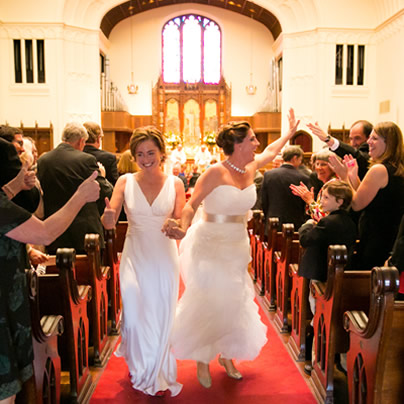
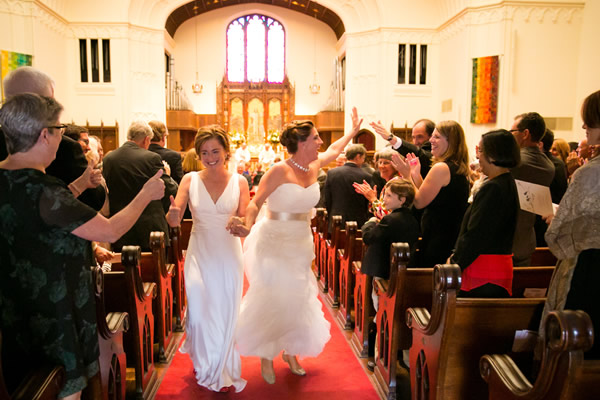
Lou Ann Sandstrom, left, and Kathleen Kutschenreuter at their wedding recessional at Foundry United Methodist Church on Sept. 28, 2013. (Photo by Paul Morse Photography; courtesy the couple)
Like the couples themselves, same-sex weddings come in all shapes and sizes.
We got to know three local couples that each went about it in different ways.
Kevin Anthony Rowe, 31, married Will Shreve, 28, last Sept. 19 at the Jefferson Memorial. They kept it “small and quick” so they could tie the knot before Shreve left for the Middle East on Christmas Day for his deployment with the U.S. Navy.
Greg Alexander, 43, married his partner of 13 years, Paul K. Williams, 47, on Jan. 31 at the Baltimore City Circuit Courthouse.
Kathleen Kutschenreuter, 43, and Lou Ann Sandstrom, 54, did the more traditional “big church wedding.” They had about 130 guests when they wed last Sept. 28 at Foundry United Methodist Church in Washington, an event that was also the day of their then-6-month-old daughter, Ava Kae’s, baptism.
For myriad reasons, each couple’s decision, they say, made the most sense for them.
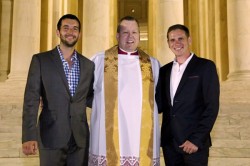
Kevin Anthony Rowe, left, with husband Will Shreve, right. They were married Sept. 19 by Rev. David Lett, center. (Photo by John Ellis)
Rowe and Shreve met on a Sunday evening at Nellie’s Sports Bar in January 2012.
“It sounds cliché, but I knew from the minute I met him, this is the guy I was going to end up with,” says Rowe, a budget analyst at National Geographic who also tends bar on weekends at Town Danceboutique. “I’d had long relationships before … but I never had been so sure about something. …. In my mind, it was only a matter of time.”
He says they might have done a destination wedding had time not been so pressing, but they’re happy with how things worked out. They chose the Jefferson Memorial because it’s Shreve’s favorite D.C. memorial.
Rowe says it was all pretty easy to arrange. After downloading a form from the National Park Service website and sending $100, the permit was e-mailed back to them within about three days.
“It was super easy,” he says. “Once you get there, there are only certain areas you can have it, but you just ask at the little guard spot and they tell you where you can and can’t go.”
The ceremony lasted about 15-20 minutes and Rev. David Lett, a friend of the couple, officiated. They were at the site about an hour.
On the Thursday of their wedding, they had dinner beforehand and an after party at Number Nine, a gay bar on P Street, with balloons and Champagne.
Rowe says the separation is hard but he’s making do with Skype, texts and the like. They video chat every couple days and are planning a few trips throughout the year to see each other. Rowe says he keeps busy working two jobs and has great friends around to help fill the void.
Because they had lived together near Columbia Heights about a year before getting married, Rowe says the wedding itself didn’t change how their relationship felt.
“It kind of just felt like another day together,” he says. “We fit so well on every level and it’s so comfortable that just because the label was there now didn’t change anything.”
Greg Alexander, a magazine editor, thought he would feel pretty much the same way. He and Williams had lived together for about 10 years by the time they wed last month.
“It’s hard to describe it,” he says. “We’d been together 13 years and I didn’t expect it to feel any different. We’d exchanged rings on our 10th anniversary, just the two of us in the garden. But something about it, after it was done, not to sound cheesy, but it feels more real. When I look at my ring, it’s not just, ‘Oh, those are the rings we gave each other because we love each other.’ Now it’s more like, ‘Yes, we are married.’”
The couple thought about getting married when same-sex marriage became legal in Maryland in January last year, but decided to wait. When key parts of the Defense of Marriage Act (DOMA) were repealed by the Supreme Court later in the year, Alexander says, “That was kind of the final push we needed.” They waited until 2014 for tax purposes.
“We were pretty sure this is what we wanted,” says Williams, who is president of Congressional Cemetery. “I think we were more concerned we might offend some family members or friends by not doing something bigger, but we talked about it with them and decided to do some nice dinners with our two families a few months later. That’s just kind of the way it worked out best for us, especially for our families and their schedules.”
Alexander says in early discussions that, “luckily we were on the same page about this.” They’d had large parties with family, friends, banquet halls, private chefs and that type of thing for each other on their respective 40th birthdays, so when it came time to tie the knot, they agreed simpler was the way to go.
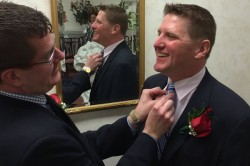
Paul K. Williams, left, with husband Greg Alexander the day they married at the Baltimore City Circuit Courthouse. (Photo courtesy the couple)
He says there was some initial concern that doing it so low key might feel anticlimactic, but he says the courthouse didn’t have the bare bones feel he thought it might.
“I thought it might be a little two-second thing like going to jury duty or something, but we were pleasantly surprised,” Alexander says. “It’s actually pretty nice. The people were amazing, which kind of caught us a little off guard. … You go into a little room that’s decorated and they have an officiant do your vows. … We couldn’t get over how excited the city employees were. We had total strangers hugging us and telling us they were so happy two gay men could get married. We didn’t expect that from the Baltimore City Courthouse.”
The license was about $85 and there was an additional $25 charge for the civil ceremony. Three couples joined them for dinner afterward.
“I think the couple needs to really ask themselves how they want to remember the occasion,” Williams says. “I know when we had the big [birthday] party, it went so fast and it was so involved and complex, I barely remember the conversations we had. I think it’s just something that’s very individual and each couple needs to look at themselves and how they like to entertain and decide how they want to do it.”
Kutschenreuter and Sandstrom were struck by Rev. Dean Snyder’s homily when they visited Foundry United Methodist Church in November 2012. As he shared a story of a same-sex couple whose wedding he had officiated the previous day and Kutschenreuter and Sandstrom discovered the church’s social justice, community and LGBT advocacy work, it hit a nerve.
“We really knew we wanted a sacred space to really honor our desire to express our commitment in front of family and friends and we didn’t want to do it on our own, we wanted witnesses,” says Kutschenreuter, who works for the Environmental Protection Agency. “We had a desire to do it in front of a higher power … . To us, we felt for our marriage to have the best chance and to be the most grounded, we wanted it to be grounded in a spiritual context.”
They say the cost of the church was a “drop in the bucket,” considering what they spent on their reception. They said it was “less than $2,000” for the church, clergy and a team of musicians who performed. Foundry offers a discount to members.
“It’s between about $500 and $2,000 depending on how lean or heavy you want to go,” Kutschenreuter says. A reception was held that evening at the Hay-Adams Hotel.
“We have absolutely no regrets about it,” says Sandstrom, who works for the FBI. “We saw it as an investment and everyone had a fantastic time.”
“We did think along the way, ‘Oh my gosh, what are we doing, this is so stressful,’” Kutschenreuter says. “But we weren’t being elaborate just to be elaborate. We were trying to honor the fact that we’re older people, we have a daughter, it was Lou Ann’s Dad’s 90th birthday and both our dads walked us down the aisle, we had people coming from all over; there was just so much more to it than there would have been for a younger couple. But we knew this group of people would never be together any other time so we wanted it to be special. It was definitely worth it.”
Autos
Sporty sedans: BMW 530i xDrive, Mercedes AMG CLA 3
Tariffs are here and the result is financial chaos
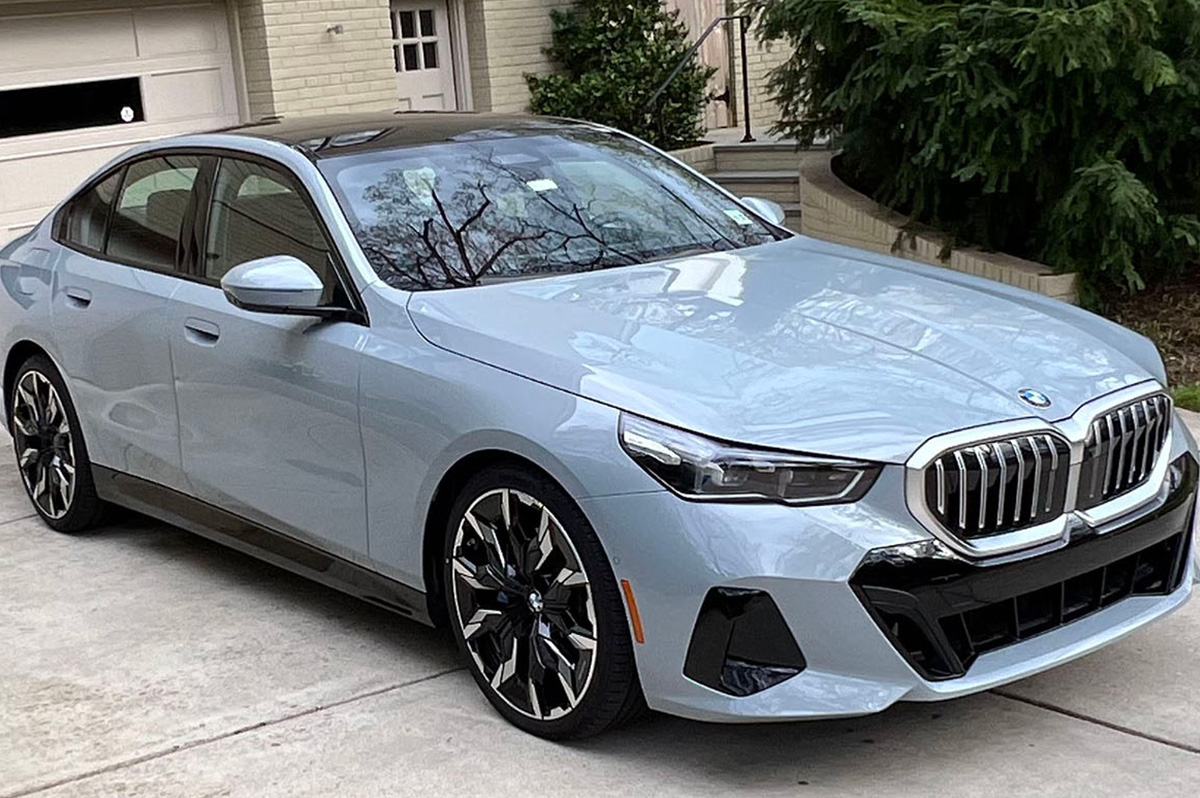
It’s official: Tariffs are here, and the result is financial chaos.
So, what to do when purchasing a new vehicle? If you need one in the not-so-distant future, buy sooner (like yesterday) rather than later. Expect prices to rise quickly, as inventory dwindles, demand soars, and automaker incentives evaporate. Of course, if a new ride isn’t a priority for at least a year or three, then hold off until the dust settles.
But for those of you looking for new wheels now, I recently drove two sport sedans that were a pleasant reprieve from the usual plethora of pickups, minivans, and SUVs.
BMW 530i xDRIVE
$63,000
MPG: 28 city/35 highway
0 to 60 mph: 5.5 seconds
Cargo space: 18.4 cu. ft.
PROS: Rakish looks. Race-car vibe. Rock-star amenities.
CONS: Rad-but-quirky infotainment system. Rich price.
IN A NUTSHELL: Classic good looks, from the iconic grille and swept-back headlights to chiseled side panels and a tasteful tush. For a gearhead like me, the BMW 530i xDrive — completely redesigned last year — is as rapturous as Michelangelo’s David. Everything here is in proportion, from the design to the drivetrain, which — along with a gutsy 255-hp turbo and all-wheel drive — helps deliver a divine experience behind the wheel. Even better, my test car came equipped with the heavenly M-Sport Package: 21-inch wheels, athletic suspension, and assorted styling upgrades.
A tech-laden cabin is outfitted with a sparkly 12.3-inch digital instrument cluster and 14.9-inch touchscreen infotainment system. With the windshield head-up display and a slew of knobs and toggle switches in the center console and on the steering wheel, I wondered if this is how it feels to pilot the Space Shuttle. There is even a back-lit interaction bar with touch-sensitive controls to adjust vent direction and other climate control settings.
All this gadgetry takes some getting used to, but the overall effect is dazzling. While a 12-speaker Harman Kardon stereo comes standard, I was jammin’ to the 16-speaker Bowers & Wilkins premium audio. Of course, such options add up quickly (on my test car, the extras totaled $13,000).
Just how fun is this car? In my favorite episode of “Hacks,” sassy Jean Smart drives a rockin’ Rolls Royce Wraith. Trust me, this four-door BMW is every bit the badass as that $300,000 super coupe.
MERCEDES AMG CLA 35
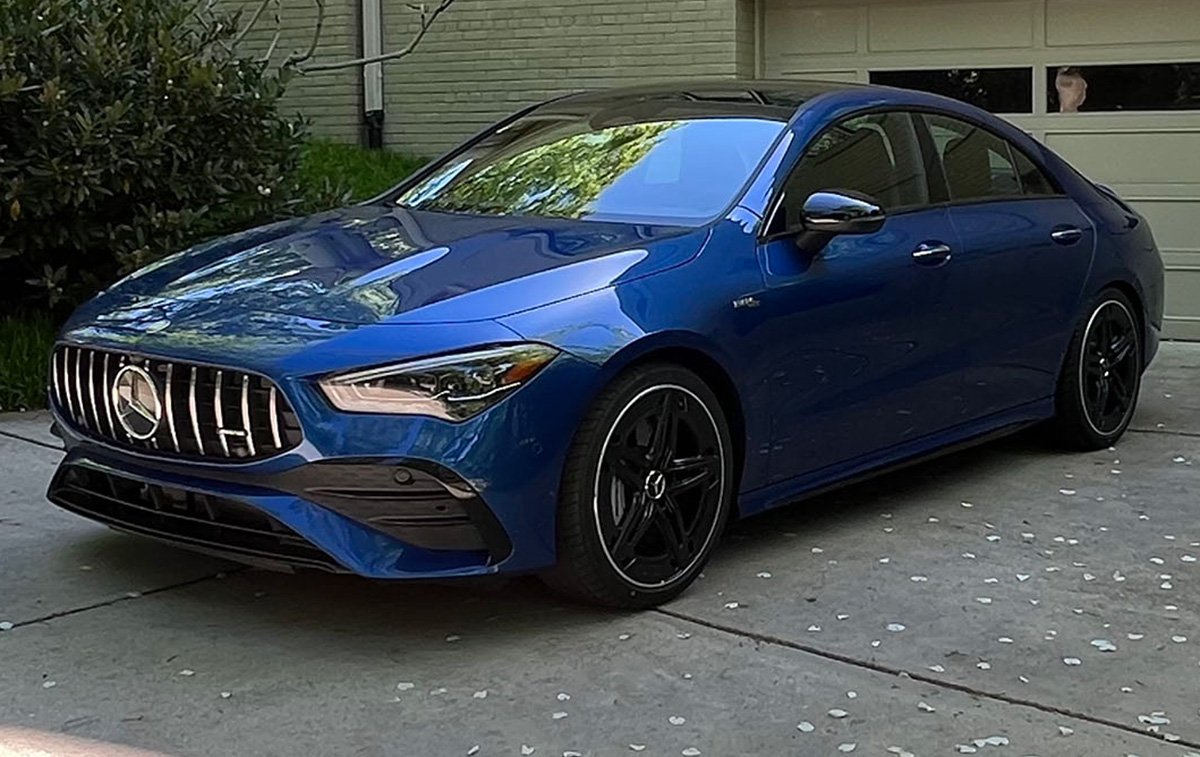
$58,000
MPG: 22 city/29 highway
0 to 60 mph: 4.8 seconds
Cargo space: 11.6 cu. ft.
PROS: Slick styling. Spiffy cabin. Sublime seats.
CONS: Smallish trunk. So-so rear headroom and legroom.
IN A NUTSHELL: Need a smaller sedan that’s just as marvy as the midsize BMW i530? Look no further than the compact Mercedes CLA-Class, which is 14 inches shorter. That’s a benefit when jockeying for parking or navigating rush hour.
Another plus: This is Mercedes’s least expensive sedan, available in three trim levels. All come with the same potent turbo but in varying power levels. The base model starts at $46,000, but I tested the first of two high-performance versions: the AMG CLA 35, which costs $12,000 more. You can open your wallet even further to snag the $67,000 AMG CLA 45.
But why bother? The AMG CLA 35 is plenty quick — faster than the BMW i530 — and boasts sport-tuned brakes, deft handling and a gritty-sounding exhaust system. The laundry list of standard features includes all-wheel drive, automated parking, gobs of the latest safety gizmos and even something called “safe-exit assist,” which prevents passengers from opening a door into traffic or speeding cyclists.
The interior is pure Mercedes, with top-notch materials, customizable ambient lighting and Burmester surround-sound audio. The overall layout—sleek and modern, but with elegant stitching in the seats and on the door panels and dashboard—is comfortable and user-friendly. Digital displays and touchscreens are similar to what’s in the BMW i530, just smaller.
Size matters, of course, which is why this vehicle’s shorter length can be a blessing but also a curse, especially when trying to squeeze passengers with longer legs into the backseats. And the dramatically sloped roofline, attractive from the outside, limits the amount of rear headroom and cargo space. Thank the automotive gods for panoramic sunroofs, which—at least for anyone in the front seats—makes this cabin feel surprisingly spacious.
Real Estate
Spring updates to sell your home for pride and profit
Consider new landscaping, power washing, creative staging

Selling a home is a big deal for anyone, but for members of the LGBTQ+ community, it comes with unique considerations—from finding affirming professionals to ensuring your home is represented in a way that reflects your values. Whether you’re a first-time gay home seller or a seasoned LGBTQ+ homeowner looking to move up, maximizing your home’s value is key to a successful and empowering sale.
Here’s how to prepare your home, your mindset, and your real estate strategy to get the most value—financially and emotionally—from your home sale.
1. Start with an LGBTQ+-Friendly Real Estate Agent
Before diving into renovations or staging, make sure your agent truly understands your needs. A gay-friendly or LGBTQ+-affirming real estate agent brings more than just market expertise—they bring cultural competence, safety awareness, and a network that supports you throughout the selling process.
At GayRealEstate.com, you can find experienced, vetted LGBTQ+ real estate agents who have been proudly serving the community for over 30 years. Working with someone who shares or supports your identity ensures your selling journey is respectful, inclusive, and effective.
2. Enhance Curb Appeal—With a Welcoming Vibe
The outside of your home is the first impression a potential buyer gets. Make it count—especially for LGBTQ+ buyers looking for a home that feels safe and welcoming.
- Fresh landscaping: Add colorful flowers, neatly trimmed shrubs, or low-maintenance greenery to appeal to eco-conscious buyers.
- Update the entrance: A new front door, stylish lighting, or even a rainbow doormat can make your home feel like a safe space from the start.
- Clean and repair: Power wash the exterior, touch up paint, and make any necessary repairs to gutters, windows, or siding.
3. Stage with Intention and Inclusivity
Home staging can add thousands to your sale price. But beyond the usual decluttering and neutral palettes, think about how your space tells a story—and who it’s telling it to.
- Create a warm, inclusive feel: Subtle touches like LGBTQ+ art, books, or even coffee table magazines can show off your personality and affirm the space for queer buyers.
- Depersonalize—but don’t erase: You don’t need to hide your identity to appeal to buyers. Let your home feel lived in and loved—while still being a blank canvas others can imagine themselves in.
- Highlight multi-use areas: Home offices, gender-neutral nurseries, or flex spaces resonate with LGBTQ+ families and professionals.
4. Update Kitchens and Bathrooms Strategically
These rooms matter most to buyers—and even small updates can yield big returns.
- Kitchen: New cabinet hardware, a fresh backsplash, and modern lighting can elevate the entire room without a full remodel.
- Bathroom: Replace old fixtures, re-caulk tubs and sinks, and add plush towels and inclusive décor.
- Energy-efficient upgrades: Touchless faucets, smart appliances, or low-flow toilets are not only trendy—they signal sustainability, which matters to LGBTQ+ buyers.
5. Make Your Home More Energy Efficient
LGBTQ+ homebuyers often prioritize sustainability. These updates not only reduce energy bills but make your home more marketable.
- Install a smart thermostat (like Nest or Ecobee)
- Upgrade insulation or windows
- Consider solar panels (especially in sun-drenched regions like California or Florida)
Bonus: You may qualify for state or federal tax credits, which can be a great selling point.
6. Know and Advocate for LGBTQ+ Housing Rights
Although housing discrimination is illegal under the Fair Housing Act, it still happens. As an LGBTQ+ seller, be aware of your rights—and those of potential buyers.
- Avoid steering or bias: Even with good intentions, make sure you’re not inadvertently influencing who views or buys your home based on identity.
- Work with affirming professionals: From inspectors to lenders, choose partners who support inclusive practices.
- Report discrimination: If you or a buyer encounters bias, report it to HUD or your local housing authority.
7. Price Your Home Right—and Market It Smartly
Setting the right price is essential to maximizing value. Your LGBTQ+-friendly agent can run a comparative market analysis, considering current trends and buyer demographics.
- Leverage LGBTQ+ real estate networks: Promote your home through platforms like GayRealEstate.com to reach an audience that understands and values your space.
- Use inclusive language in listings: Avoid gendered terms or heteronormative assumptions. Instead of “his and hers closets,” use “dual walk-ins” or “double closets.”
- High-quality photos and video tours: Showcase your home with professional, visually inclusive marketing that appeals to diverse buyers.
8. Consider Timing and Local LGBTQ+ Trends
Selling during WorldPride or just before local LGBTQ+ events may boost visibility. Also consider if you’re in or near an LGBTQ+ friendly city or neighborhood.
Not sure which areas are top destinations? GayRelocation.com tracks and shares the best cities for LGBTQ+ homebuyers, helping you tap into motivated buyers.
Final Thought: Sell with Confidence—and Community
Selling your home isn’t just about getting top dollar—it’s about closing a chapter with pride and integrity. When you center your values, work with LGBTQ+ affirming experts, and prepare your home with purpose, you’re not just maximizing your home’s value—you’re creating an empowering experience for yourself and the next owner.
Whether you’re buying, selling, or both—GayRealEstate.com is your trusted partner in every step of your journey. With a nationwide network of gay and lesbian realtors, decades of experience, and deep community ties, we ensure your home transition is safe, smart, and full of pride.
GayRealEstate.com is the nation’s leading online platform connecting LGBTQ+ home buyers and sellers with LGBTQ+ friendly real estate agents, ensuring a safe and supportive experience.
Scott Helms is president of GayRealEstate.com. To find an agent or learn more, visit GayRealEstate.com, GayRelocation.com or call 1-888-420-MOVE.
Real Estate
Navigating DMV real estate market during political unrest
Reductions in federal employment have introduced uncertainties

The Washington, D.C.-Maryland-Virginia (DMV) region has long been recognized for its robust housing market, underpinned by the presence of the federal government and a diverse economic landscape. Recent massive reductions in federal employment have introduced uncertainties, yet the area continues to offer compelling reasons for prospective homebuyers, particularly within diverse communities.
While the federal government has traditionally been a significant employer in the DMV, the region has proactively diversified its economic base. Sectors such as technology, professional services, education, and healthcare have expanded, mitigating the impact of federal job cuts. This diversification fosters some economic resilience, which offers our area a semblance of protection against the impending unknowns that we currently face. Nothing can shield real estate entirely; however, our area tends to survive these types of changes better than other parts of the country.
Despite concerns over federal layoffs, the DMV housing market has demonstrated notable stability. Analyses indicate that the number of active listings, sold properties, and median sales prices have remained steady on a year-over-year basis. This steadiness suggests that the market is adapting to changes without significant disruption.
Furthermore, while there has been a slight increase in home listings, this trend aligns with typical seasonal variations and does not solely reflect federal employment changes. The luxury property segment, in particular, continues to thrive, indicating sustained interest and investment in the region.
The DMV region is renowned for its cultural and demographic diversity, with areas like Montgomery County, Md., being among the most ethnically diverse in the nation. This inclusivity extends to various communities, including LGBTQ individuals, fostering a welcoming environment that enhances the area’s appeal. Even though the current administration is fostering anti-diversity ideology, I remain confident that our LGBTQ community will continue to thrive even as these destructive forces work against us.
Local governments within the DMV have implemented policies aimed at promoting affordable housing and preventing displacement, particularly in the wake of economic shifts. Initiatives like the Douglass Community Land Trust in Washington, D.C., exemplify efforts to maintain housing affordability and support community stability.
Additionally, jurisdictions such as Montgomery County have longstanding Moderately Priced Dwelling Unit (MPDU) programs that require developers to include affordable housing in new residential developments. These policies contribute to socioeconomically mixed neighborhoods, benefiting diverse populations.
Despite Elon Musk’s brandishing of a chainsaw to the federal workforce, our real estate market continues to thrive. The DMV region maintains its appeal. Economic diversification, market stability, commitment to diversity and inclusion, and progressive housing policies collectively contribute to an environment that supports and attracts diverse communities. Prospective homebuyers can find reassurance in the region’s resilience and ongoing efforts to foster an inclusive and vibrant community. These are only a few among the many reasons to have a positive outlook while considering real estate options in our area.
It is important to consider working with brokerages, brokers, agents, lenders and title companies who align with our community and our objectives. Not all LGBTQ agents work for brokerages that support or understand the needs of the members of our community. Do your research and find out who has donated money to what political causes. Now more than ever we must support members of our community to protect our way of life and our very existence.
Stacey Williams-Zeiger is president/principal broker of Zeiger Realty Inc. Reach her at [email protected].
-

 Obituary4 days ago
Obituary4 days agoLocal attorney, LGBTQ rights advocate Dale Sanders dies at 75
-

 U.S. Federal Courts3 days ago
U.S. Federal Courts3 days agoFederal judge blocks Trump passport executive order
-

 Mexico4 days ago
Mexico4 days agoGay couple claims Puerto Vallarta wedding venue discriminated against them
-

 Books3 days ago
Books3 days ago‘Pronoun Trouble’ reminds us that punctuation matters











